Opening a new coffee roastery today seems like a daunting idea. There’s the increasingly troubled U.S. economy, but even more alarming is the unprecedented turmoil in the global coffee industry, which includes insultingly low prices paid to farmers, infrastructure challenges, and climate change, which has virtually wiped out some regional coffee industries, put many more under extreme stress, and ultimately threatens the very future of Arabica coffee (not to mention life on earth). And yet, it seems that there’s a new retail coffee experience any time we want one: at the café on the busy corner downtown, at the farmers’ market stand, online (of course), and even at the hipster hotel.
In its 2019 beverage trends report, the National Coffee Association (NCA) reports that, while the overall rate of coffee consumption remains flat since last year — 63% of Americans drink coffee every day — what we want in our cup has shifted significantly over the years. For the first time in the NCA’s history of reporting on consumer trends, 2019 marks the year that a whopping 60% of coffee drinkers buy “gourmet” coffee, defined (with breathtaking inclusivity) as “brewed from premium varieties,” while 40% of coffee drinkers aren’t as picky and choose “non-gourmet” coffees that are lower-priced and readily available at supermarkets.
This trend, however vaguely defined by the NCA, might explain the continued roastery boom. This month, we put out a call for coffees from roasters in North America who’ve been open for fewer than two years, and we received 40 samples (36 from U.S. roasters and four from Canadian). We received coffees from roasters completely new to us, as well as coffees from individual roasters we’ve known over the years who left successful brands to start their own roasting businesses. Despite the “newness” of the eight roasteries whose coffees we feature in this report, ranging in score from 91-94, there’s a significant amount of collective expertise among the folks behind these new ventures.
Carving a New Path
Our top-scoring coffee is Toronto-based Stereo Coffee Roasters‘ Kenya Gakundu (94), a classic Kenya with its savory-leaning but nonetheless juicy-bright cup. And we were pleased to find, after blind-cupping all the coffees we received, that this one was roasted by Geoff Polci, formerly of Propeller Coffee, a brand whose coffees have earned high ratings over the years. Polci was instrumental in Propeller being named 2016 Micro-Roaster of the Year by Roast magazine, but he was hankering to open his own shop. Stereo is the fulfillment of that desire and the location of his mission to develop each coffee’s fullest potential, a lofty aim that Polci says has been aided by his consultations with roasting and brewing expert Scott Rao. Kenya is Polci’s favorite coffee origin and, for him, the Gakundu has a “sparkling acidity that just dances on the tongue.”
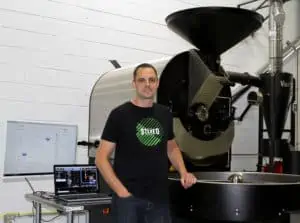
Geoff Polci, Stereo Coffee’s founder and roaster. Courtesy of Stereo Coffee.
Polci sees the disconnect between the crisis at the farm level and the enjoyment of coffee at the consumer end. He says, “The average coffee consumer has no idea what’s happening at origin — these stories don’t get a lot of coverage. Roasters need to do a better job educating consumers so they understand why good coffee costs more and why it’s worthwhile to pay more for these products.”

Jake Deome, roaster and founder of Looking Homeward Coffee. Courtesy of Looking Homeward Coffee.
Jake Deome, founder of the new Looking Homeward Coffee, was also a familiar name to us, having roasted for Temple Coffee in Sacramento before taking off for Seattle to launch his own company. In his 12 years in the coffee industry, Deome has been a cashier, barista, lead barista, apprentice coffee roaster, production roaster, head roaster, quality control manager, and green buyer — so it’s fair to say that he knows the ropes. His Ecuador Hernan Zuniga (93) is sweet and rich-toned, with notes of warming spices and honey. Deome’s concept for Looking Homeward is that coffee can be a grounding force in finding where we belong, physically, emotionally, and spiritually. His philosophy of business is that “Paying your workers a living wage isn’t going to bankrupt your company,” and he wants his roastery to be a case in point. He “resists pressures to de-value” his coffee, and he works to educate customers on what it costs to bring a high-quality product to their table.
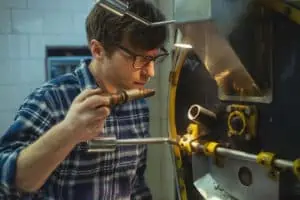
Tim Taylor, Pedestrian Coffee’s owner and roaster. Courtesy of Pedestrian Coffee.
Pedestrian Coffee, in the Chicago suburb of Lake Forest, Illinois, was founded by another coffee veteran, Tim Taylor, a home roaster who learned the craft by trial and error before opening Ipsento, a brand invested in top-notch sourcing and transparency. His new venture, Pedestrian Coffee, is about taking the pretension out of what should be an accessible experience for all. His shop is located in the corporate headquarters of Grainger, a large tool-supply company whose employees are mostly blue-collar workers who haven’t traditionally been inclined to explore the high-end coffee market. His Ethiopia Guji Uraga we review here at 93 is a classic type, and meets his standards of accessibility, both in terms of flavor profile and price point.
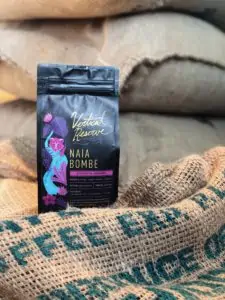
Coffeebar’s Ethiopia Sidama Naia Bomb Natural Vertical Reserve. Courtesy of Coffee bar.
Coffeebar, the largest of the brands whose coffees we review here — we rated its Ethiopia Sidama Naia Bomb Natural Vertical Reserve at 93 — has been in business for nine years but just began roasting in-house in 2018, a dramatic departure from its old business model that has allowed for much more control over every step of the process. David Wilson, director of coffee, along with owner Greg Buchheister, decided to deepen their relationship with producers at origin by taking on roasting at their end. Wilson, who joined Coffeebar after a stint in importing, says, “Having come back to roasting from importing allowed me to see the crucial role that importers play in the supply chain, a role that is quite often glossed over by roasters. Since the beginning, we’ve tried to focus on building relationships with importers who are more region-specific, and through them work to provide specialty-market access to producers who may not otherwise have it.”
Starting From the Ground Up
For Ryan Choi, roasting coffee is a family affair. He and four family members used to roast on popcorn poppers in the back yard until they took the plunge and launched Foggy Hills Coffee Company in 2018. Choi does his roasting at Bay Area CoRoasters (CoRo) in Berkeley, California, a co-roasting facility that provides access to equipment and technology to roasters at a low-cost entry point. In addition to pursuing careful sourcing and roast-profiling, Choi started a non-profit initiative, “Roasting for Research,” that raises money and awareness for ALS disease. We rated the Foggy Hills Guatemala San Cristobal at 91 for its sweet herbaceousness and bright, citrusy acidity.
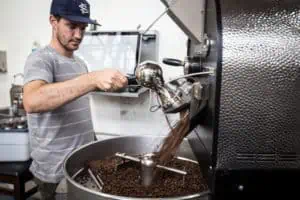
Ryan Choi, Foggy Hills Coffee co-founder and roaster. Courtesy of Foggy Hills Coffee.
Souvenir Coffee is a small shop we found in Coffee Review’s own Berkeley, California neighborhood. It turns out that Souvenir, like Foggy Hills, also roasts at Berkeley’s Bay Area CoRoasters. We stopped by the shop and picked up a bag of Souvenir’s Ethiopia Guji Gerbicho Natural, which impressed us at 92 with its cleanly sweet berry notes and delicate, honeysuckle-like florals. We weren’t able to talk with the roaster directly, though the brand’s engaging though rather enigmatic motto is, “People first, then coffee.”
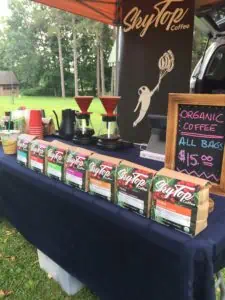
SkyTop Coffee’s stand at the local farmers’ market. Courtesy of SkyTop Coffee.
SkyTop Coffee Company was founded in 2018 by Serena and Aaron Lerner in Cazenovia, New York. Aaron has worked in the specialty coffee industry for 15 years, but in sales, while Serena is a marketing professional whose wheelhouse is in marketing and design. Their shared interest in sustainability led them to the decision to source certified organic and/or fair trade-coffees as much as possible. The Peru Paltachayoc we review here at 91 is both, and it’s also richly chocolaty with gentle, rounded acidity. SkyTop’s mission is three-fold: to highlight the positive impact of organic farming practices; to limit stress on the environment by utilizing compostable product packaging; and to bring awareness to the coffee-pricing crisis affecting farmers at origin.
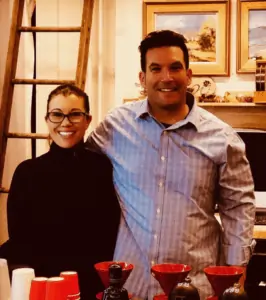
Serena and Aaron Lerner of SkyTop Coffee. Courtesy of SkyTop Coffee.
Transplanting Talent
Business and life partners Luis Hellmund and Cristina Coll, both from Venezuela, met because of their shared love of coffee. After travels to Miami, Brazil and Boston, where they were exposed to different roasting styles, they began buying small amounts of green coffee from various origins and roasting it at home. They eventually settled in the mountain town of Asheville, North Carolina, which reminded them both of Caracas, and launched South Slope Coffee, a roastery with a decidedly anti-marketing-gimmick bent and a down-to-earth approach to specialty coffee. They chose the Nicaragua Finca Idealista we review here at 92 not only for its lively brightness but also for farmer Ben Weiner’s practice of paying workers double the local wage and buying a rainforest adjacent to his farm so that it wouldn’t be developed.
Third Wave Roasting But a Decided Absence of Snobbery
One common denominator among the eight roasters whose coffees we review here is a stated desire to make high-quality coffee accessible to all, a tricky proposition in the industry right now. Roasters must balance the ethical imperative to pay farmers fairly for their work at origin while educating consumers about what “value” actually means in the complex world of coffee in the 21st century.
All of the coffees we review for this report are medium-light to medium-roasted, indicating each roaster’s desire to highlight the best characteristics of the individual coffee, taking care not to obscure aromas and flavors with too heavy a roast. This approach to roast style puts them squarely in line with the dominant third-wave trends of the last decade of specialty coffee, yet their concern with making quality coffee more accessible to a wider range of consumers might be a recalibration of specialty coffee ideals in response to the new realities of the broader coffee industry.










